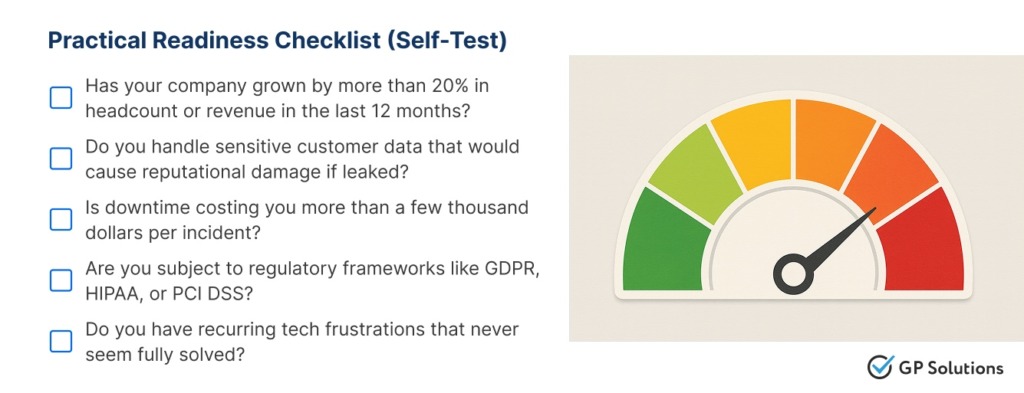Every business today runs on technology, whether you admit it or not. A retailer depends on payment systems and inventory platforms. A logistics company can’t move a truck without route optimization software. Even the smallest professional service firms lean on email, cloud storage, and client portals.
And yet, many leaders still treat IT consulting like a one-off. They call in experts only when something is broken, or when a new piece of software has to be bolted on. That approach can work for a while. But as technology becomes more complex and as security risks grow, one-off fixes start to look a lot like patching holes in a sinking ship.
That’s where ongoing IT consulting services come in. Instead of calling for advice when you’re already in trouble, you make IT guidance a continuous part of your strategy. It’s not just about solving problems, it’s about anticipating them, steering clear of them, and using technology as a source of power for business growth.
But consulting isn’t free, and not every company is ready for it. So how do you know when the time is right? And what exactly are the benefits of IT consulting services when you commit for the long haul? Let’s dig in.

Need help in strategizing your IT resources? You are in the right place!
Why Businesses Wait Too Long to Bring in IT Consultants
It’s surprisingly common for companies to hold off on IT support until they’ve hit a wall. The reasons are familiar:
- Budget concerns. Leaders assume that consultants are too expensive and that an in-house IT generalist can “handle things for now.”
- Underestimating complexity. A system seems simple at first, until integrations, security requirements, and compliance standards start piling up.
- The “if it isn’t broken” mindset. If the website loads and the software works, why spend more money?
The trouble is, IT issues rarely announce themselves politely. A breach, an outage, or even a poorly executed upgrade can cost far more than continuous support ever would. For many businesses, the first serious incident is the wake-up call: “We should have invested in consulting earlier.”

The Real Benefits of IT Consulting Services
So what changes when IT consulting shifts from a project-by-project expense to a continuous relationship?
In short: everything.
Instead of rushing to patch problems, consultants act as an extension of your leadership team, aligning technology with long-term goals. This turns IT from a cost center into a business enabler.
Here are some of the key benefits of managed IT consulting services when it becomes an ongoing commitment:
- Predictable support instead of firefighting. You don’t just get someone to fix emergencies — you get experts who prevent them.
- Technology that grows with you. As your business evolves, so does your IT environment. You avoid the sudden shocks of “we outgrew our systems.”
- Clear ROI. By avoiding downtime, optimizing licenses, and choosing the right tools the first time, you save both time and money.
- A stronger security posture. Regular monitoring, patching, and audits make breaches less likely and recovery faster if one does occur.
And perhaps most importantly, IT stops being something you react to and becomes something you actively use to push the business forward.
Signs You’re Ready to Move Beyond One-Off Advice
Not every business needs IT consulting from day one. But there are clear signs that it’s time to stop dabbling and start treating IT consulting as an ongoing investment.

- You’ve had more than one major IT issue in the last year. If “the system is down” has become a recurring phrase, you’re already paying the cost of neglect.
- Your team is wasting time on tech headaches. When staff members are fixing printers, troubleshooting emails, or figuring out why integrations fail instead of doing their real jobs, productivity is bleeding away.
- You’re expanding or plan to. Growth multiplies complexity. New locations, new hires, and new tools all add strain to systems. A consultant can make sure IT scales with the business instead of slowing it down.
- Security is keeping you up at night. If you’ve ever wondered, “What happens if our customer data leaks?” then you already know the risk. Ongoing consulting bakes in security as a daily priority, not a once-a-year audit.
- Compliance is on the horizon. For companies in finance, healthcare, or any regulated field, having IT consultants manage compliance requirements is not optional but survival.
When these factors line up, the question isn’t whether you can afford IT consultants. It’s whether you can afford not to hire them.
Breaking Down the Benefits of Hiring IT Consultants
Let’s take a closer look at the specific benefits of hiring IT consultants for ongoing support, with examples of how they play out in real life.
Staying Ahead of Security Threats
Cybercrime is a mainstream business risk. Attackers don’t care if you’re a startup or a global corporation. If your systems are unpatched, you’re a target.
An ongoing IT consulting team makes sure security updates are applied quickly, access controls are maintained, and regular audits catch vulnerabilities before criminals do. The benefit protects your calmness and brings peace of mind. Instead of reacting to scary headlines, you already know where you stand.
Smarter Technology Investments
Plenty of companies overspend on tools they don’t fully use. A consultant evaluates whether you really need that pricey software license or if a leaner option will serve just as well. They also help avoid the opposite mistake: underinvesting in a system that later becomes a bottleneck.
This guidance can save hundreds of thousands over the years by making sure every tech dollar adds power for business outcomes.
Freeing Up Your Team
Employees hired for marketing, finance, or operations shouldn’t be doubling as tech support. When they do, not only is productivity lost, but mistakes happen. Ongoing IT consulting lets people get back to their core roles while ensuring issues are handled by specialists who won’t miss critical details.
Growth Without the Growing Pains
Picture this: your company suddenly needs to open a second office, or your team doubles in size almost overnight. Exciting? Absolutely. But without the right systems in place, it can also be a nightmare: slow networks, permissions gone haywire, people locked out of tools they need. Ongoing IT consulting helps you avoid that scramble. Your infrastructure, cloud setup, and user management are designed to stretch as you grow, so expansion feels natural instead of disruptive.
Strategy That Doesn’t Leave Tech Behind
Another big win from working with IT consultants is how they connect day-to-day technology with long-term business goals. Too often, companies treat IT as a separate lane from strategy but the two are deeply linked. A good consultant won’t just plug in a new tool and walk away. They’ll ask where you want the business to be in two or five years, and then map the tech foundation to get you there. It’s less about installing software, more about building a roadmap that ties every system to the bigger picture.
That perspective keeps you from chasing shiny objects and instead builds a tech stack that actually advances your goals.
What Ongoing IT Consulting Looks Like in Practice
For business leaders, the idea of “ongoing consulting” can feel abstract. What does it actually mean day to day? To make it less theoretical, let’s walk through what the first few months of an ongoing IT consulting engagement typically look like.

The Initial Assessment
Consultants usually begin with a full audit of your current systems. This includes infrastructure health, cybersecurity posture, software licensing, and workflow analysis. The goal isn’t just to find what’s broken but to identify hidden inefficiencies — places where time, money, or resources are being lost.
Strategic Alignment
Next comes mapping IT priorities to business goals. If growth is the focus, the consultants may recommend scaling your infrastructure or moving to cloud services. If risk reduction is critical, they’ll put more energy into tightening compliance, updating legacy systems, or refining disaster recovery plans.
Quick Wins and Immediate Fixes
Early on, the team often addresses the low-hanging fruit. That might mean patching known vulnerabilities, replacing unsupported software, or cleaning up access rights. These visible improvements build confidence and show the tangible benefits of IT consulting services almost immediately.
Roadmap Development
With the foundation stabilized, consultants design a longer-term roadmap. This typically includes modernization projects, automation opportunities, and a phased upgrade plan spaced out to match budget cycles and minimize disruption.
Continuous Optimization
After the initial setup, ongoing consulting means regular check-ins, proactive monitoring, and adapting the strategy as business needs evolve. It’s not a one-off report; it’s a living partnership where technology shifts in step with your growth.
For executives, this process has a major advantage: predictability. Instead of bracing for the next IT emergency, you know what’s coming, what it will cost, and how it supports business outcomes. That clarity is one of the most underrated benefits of hiring IT consultants.
When to Make the Jump: A Practical Checklist
Still wondering whether it’s time? Here’s a quick checklist to measure your readiness for ongoing IT consulting:

If you answered “yes” to two or more, the case for ongoing consulting is already strong.
The Risks of Waiting Too Long
Let’s be blunt: many companies wait until after a crisis to invest. The costs of waiting can be brutal:
- Data breaches. Once data is stolen, you can’t unring the bell. Customers may never fully trust you again.
- Downtime. Every hour systems are offline is money lost, sometimes tens of thousands of dollars.
- Regulatory fines. Non-compliance can cost millions, especially for global businesses.
- Lost opportunities. While you’re stuck firefighting, competitors are moving ahead with smoother, faster systems.
Waiting might feel cheaper, but in practice, it’s one of the most expensive decisions a business can make.
Final Thoughts
IT consulting used to be about advice. You’d call in an expert, take notes, and maybe implement their recommendations. But modern businesses need more than advice. They need ongoing support, continuous monitoring, and strategic alignment.
The benefits of IT consulting services grow over time: reduced risk, smoother operations, smarter investments, and stronger customer trust. The same goes for the benefits of managed IT consulting services, which turn IT into a predictable strength instead of a lurking liability.
So when should you invest? The answer is simple: before the next crisis hits. Because by the time you’re patching holes, the damage is already done. If you want IT to become a source of power for your business, not a headache, ongoing consulting isn’t a luxury. It’s the foundation.
If you have your reasonable doubts as to where to start and whether you need IT consulting at all, how about a non-binding free call with IT consultants from GP Solutions? We’ll have a quick look at your pain points and bottlenecks and offer the optimum strategy to overcome IT challenges. Reach out to our team, and we’ll be happy to assist.
Frequently Asked Questions
One-off consulting usually means bringing in an expert for a single project or troubleshooting task. Ongoing IT consulting is a long-term partnership where consultants continuously monitor, optimize, and align your IT with business goals. The latter shifts IT from being reactive to being a proactive growth driver.
Common signs include frequent IT problems, employees losing time on tech issues, rapid business growth, security concerns, and upcoming compliance requirements. If two or more apply, it’s usually the right time to consider ongoing support.
Not necessarily. While there is an upfront cost, ongoing consulting reduces downtime, prevents breaches, optimizes software licenses, and helps avoid costly mistakes. Many businesses find that long-term consulting provides a clear ROI compared to the unpredictable costs of emergency fixes.
While every business can benefit, industries with sensitive data or strict regulations such as finance, healthcare, logistics, and e-commerce gain the most. These sectors face higher risks of breaches and compliance penalties, making proactive consulting essential.
Consultants provide continuous monitoring, regular patching, access control management, and security audits. Instead of waiting for incidents, they identify vulnerabilities early, reducing the likelihood of breaches and improving recovery times.
Typically:
- A full IT assessment and audit
- Strategic alignment with business goals
- Quick fixes for urgent gaps
- Development of a longer-term roadmap
- Continuous monitoring and optimization
On-call support is reactive: you call when something breaks. Managed IT consulting is proactive: consultants track system health 24/7, apply updates, provide reports, and act as strategic partners. This approach eliminates surprises and ensures predictable IT performance.
The risks include data breaches, costly downtime, regulatory fines, and missed opportunities. Many businesses only act after a crisis, but by then, the financial and reputational damage is much harder to repair.


















